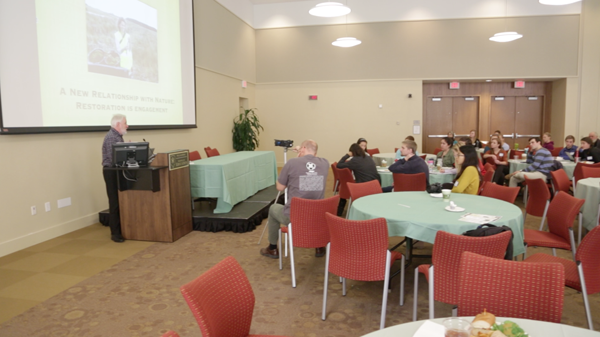Approximately 60 staff members and students gathered inside the School of Education Saturday, Oct. 25 to talk about sustainability in the second annual Sustainability Summit.
“The summit started last year just like everything else at William and Mary — with a little resources and a lot of passion,” Committee on Sustainability co-director and environmental science professor Dennis Taylor said,
The summit, organized by the Committee on Sustainability, was a product of a green fee grant and dedication from the student and sustainability fellows — Sharon Hartzell ’14 and Patrick Foley ’12.
COS programs and education subcommittee co-Chair Natalie Hurd ’16, sustainability director Calandra Waters-Lake, professor Andrew Fisher and Summit Working Group volunteers organized this year’s event.
“The summit was designed with the intent to bring individuals and organizations together in order to facilitate increased communication and innovation, and I think we achieved that goal,” Hurd said.
The summit was split into three sections: defining sustainability through professors, through students and through food.
Each professor looked at the subject of sustainability through a different lens. Fisher used a historical perspective.
“History helps us see how we got into these messes,” Fisher said. “By understanding the past, we have a better idea of what will work in the future. A sustainable future would be one where both human and non-human life can be adequately sustained.”
Student interns also spoke about their experiences working in the environmental field.
Akshay Deverakonda ’15 interned for the Environmental Protection Agency during the fall of 2012 through the William and Mary in Washington program. He noted how, although Washington, D.C. is filled with people with economic backgrounds, his employers told him that getting a science degree was the way to go.
“On one side you need to understand the economics behind environmental politics — the ‘hey this might save you money’ attitude — but on the other hand if you have a science degree you stand out among the sea of government majors,” he said. “With a science background, you make the concepts more accessible.”
Audrey Kriva ’17, the founder of DormMania, also gave advice to students who may want to start green initiatives.
“It is really important to do your research ahead of time, share ownership, and break your project into easy-to-follow steps. However, everybody has their own way of doing things and that’s important to recognize that too,” Kriva said.
The last panel discussed sustainable food. Committee on Sustainability member and leader of Campus Gardens Nora Jackson ’16 said she sees the sustainable food process as cyclical.
“We do not want to have any inputs that lead to outputs that fall on people,” she said. “We need to think about how our food choices impact other people and places. We must always vote with our dollar.”
Lisa Lawrence, Virginia Institute on Marine Science Seafood Educator, reiterated the point of responsible food practices.
“Eat what’s fresh. Eat what’s in season. It’s like when you go to Food Lion and see a cheaper shrimp option from Thailand and a more expensive alternative from the United States — choose the one from the U.S.” she said. “By choosing the one from the U.S., you know it has gone through the U.S. regulations, whereas for the option abroad, you can’t be so sure.”
The last part of the summit was dedicated to ecological restoration, the idea of recovering a damaged eco-system. Keynote speaker Paddy Woodworth, a former journalist for The Irish Times and author of “Our Once and Future Planet: Restoring the World in the Climate Change Strategy,” discussed how what many people consider as “natural” is sometimes socially constructed by humans over time. In this way, he challenged the audience to look at the human and nature dynamic differently.
“Ecological restoration … gives people hope. It shows us that people can engage in an ecosystem that will make that system richer — more biodiverse, function better and I think that’s very exciting,” Woodworth said. “A lot of people have an idea that you can only destroy or preserve and restoration is a different approach which shows us that we belong in nature and we can have a good role in nature as well.”

